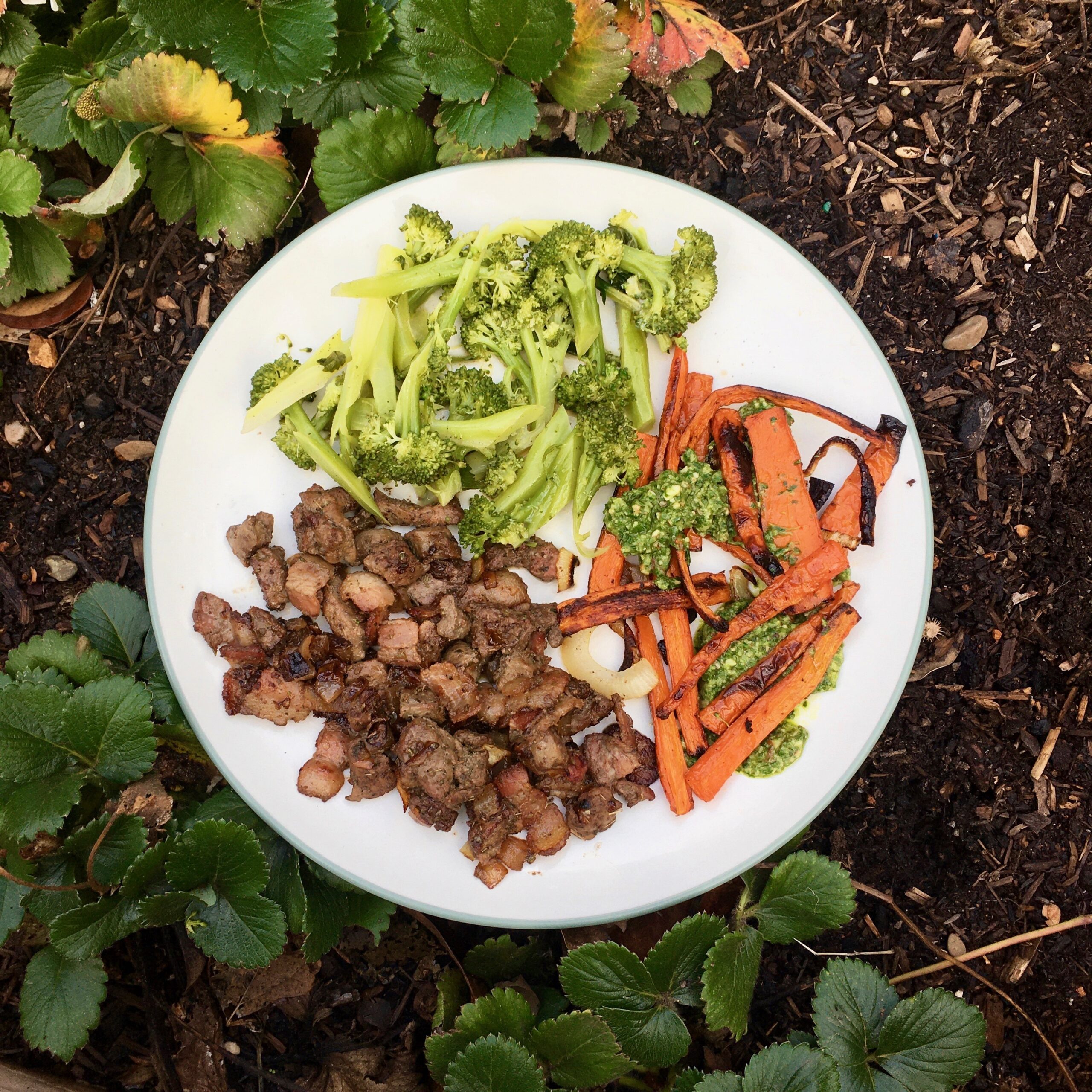Overcome Your Gut + Digestive Issues With Ancestral Nutrition
How to Balance Nutrient Intake and What Are Good Sources of Micronutrients

(Recipe for the sautéed liver meal in the picture here)
Miconutrients (vitamins and minerals) are essential nutrients you must obtain from your diet. You need far less micronutrients than you do macronutrients, hence the prefix “micro”). Each vitamin and mineral has a different function/purpose. Therefore getting enough of each one is important.
Many of these nutrients share binding sites (areas where they can be absorbed from the intestines into the blood stream) and therefore compete for the chance to bind and be absorbed. Too much of one nutrient (for example iron) can mean another (in this case calcium) is not getting a chance to bind and absorb into the blood stream. This can lead to deficiency, in this case calcium deficiency.
Many nutrients also work together, without adequate levels of one nutrient (for example retinol vitamin A) the other can’t function properly (In this case copper, vitamin D, iron, and more).
As you can see balancing nutrient intake is complex and important.
So how do you do it?
Some people turn to supplements, however in most cases I don’t recommend this. Unless you really know what you are doing, you can easily cause second hand deficiencies. Take the iron and calcium example from earlier. If you supplement with more iron than you need, you could prevent calcium from being absorbed and cause a calcium deficiency.
Multivitamins are no better. Since multivitamins are not tailored to supplement your diet specifically, you can see the same issue with deficiencies here.
So what the heck do you do?
1) Eat a variety of organ meats. Organ meats are the most nutrient rich foods and each organ is high in different nutrients. Eating a wide variety of organs is a great way to balance nutrients. I recommend you make around 10% of your meat intake from organs.
2) If you don’t want to eat organs, you can take a mixed organ supplement. Since this is from real food and has a variety of organs it is much more balanced then your typical multivitamin and far less likely to cause deficiency. Ancestral Supplements has a great Grass Fed Beef Organ Meats Supplement that I highly recommend.
3) Eat nutrient rich foods like meat, fish (especially fatty fish), seafood, dairy (if tolerated), eggs, and fish eggs regularly.
4) Make up for nutrients you know you aren’t getting enough of. For example if you don’t eat dairy, eat bone marrow, bone broth, and ground up eggshells to ensure you get enough calcium.
* If you’re unsure about how to do this and/or would like help balancing and optimizing your nutrient intake, I can help you with that in my 1 on 1 coaching service: Ancestral Nutrition Coaching! If you’re interested, you can find out more here!
Now that you know a little bit about micronutrients, let’s look at good sources for micronutrients:
Good Sources of Micronutrients:
Vitamin A (Retinol):
- Liver
- Butter
- Salmon
- Mackerel
- Dairy
- Blue Cheese
- Eggs
- Goat Cheese
B Vitamins:
- Liver
- Kidney
- Heart
- Gizzards
- Spleen
- Brain
- Sweetbread (Thymus and Pancreas)
- Tripe
- Oysters
- Red Meat
- Cheese
- Tuna
- Chicken
- Anchovies
Vitamin C:
- Liver
- Brain
- Spleen
- Adrenal Gland
- Seasonal Fruits
- Bell Peppers
Vitamin D:
(Sun is the best source)
- Butter
- Lard
- Sardines
- Salmon
- Mackerel
- Herring
- Oysters
- Salmon Roe
- Eggs
- Liver
- Cheddar
Vitamin E:
- Milk
- Almonds
- Salmon
- Grass fed red meat
- Lobster
- Rainbow Trout
- Goose
- Octopus
- Salmon Roe
- Snails
- Cod Liver
- Butter
- Eggs
Vitamin K2:
- Cheese
- Lard
- Natto
- Emu Oil
- Liver
- Pork Loin
- Chicken
- Bacon
- Eggs
- Beef
- Butter
Calcium:
- Dairy
- Bone Broth
- Meat Cooked On The Bone
- Eggshells (Can add to bone broth or ground into powder)
Iron:
- Liver
- Heart
- Kidney
- Gizzard
- Spleen
- Red meat
- Oysters
Choline:
- Liver
- Eggs
- Heart
Copper:
- Liver
- Heart
- Brain
- Oysters
Selenium:
- Brazil nuts
- Tuna
- Halibut
- Sardines
- Red Meat (Beef, Lamb, Pork, etc)
- Eggs
- Chicken
- Lamb
- Liver
- Heart
- Kidney
- Sweetbread
- Brain
- Gizzard
- Tripe
- Spleen
Potassium:
- Bacon
- Pork
- Salmon
- Bone Broth
- Beef
- Mackerel
- Potatoes
- Tomatoes
- Bananas
- Avocado
- Chicken
- Sweet Potato
- Leafy Greens
- Watermelon
- Beets
- Parsnips
- Yogurt
- Clams
- Seafood
- Fish
- Apricots
- Milk
- Beans and Lentils
- Coconut Water
- Prunes
Magnesium:
- Bone Broth
- Salmon Roe
- Mackerel
- Parmesan
- Dairy
- Shrimp
- Crab
- Halibut
- Salmon
- Nuts (cashews, almonds, Brazil nuts, peanuts, and walnuts)
- Dark Chocolate
- Coffee
- Sea Salt
- Avocado
- Dates
- Dark Leafy Greens (cook well)
- Banana
- Magnesium Bicarbonate Supplement (best out of 10 forms of magnesium) (supplementing magnesium can be beneficial since it’s now hard to get adequate Mg2+ due to the changes in soil and water)
Zinc:
- Oysters
- Crab
- Red Meat (Beef, Lamb, Pork, etc)
- Cheddar
- Shellfish
- Dairy
- Eggs
- Shrimp
- Chicken
- Liver
- Heart
- Gizzard
- Tripe
- Spleen
Iodine:
- Seaweed
- Cod
- Dairy
- Shrimp
Phosphorus:
- Lamb
- Pork
- Heart
- Kidney
- Sweetbread
- Brain
- Gizzard
- Tripe
- Spleen
2 Bonus Nutrients that Aren’t Micronutrients:
Omega 3:
- Fatty Fish (Salmon, Mackerel, Sardines)
- Oysters
- Salmon Roe
- Eggs
- Brain
Collagen:
- Bone Broth
- Meat Cooked On The Bone
- Connective Tissues in Meat
- Chicken With Skin On
Works Cited
- Shanahan, Catherine. Deep Nutrition. New York: Flat Iron Books. 2016. Print.
- Nutrition Data Self. Accessed 27 January 2020. https://nutritiondata.self.com/
- Health Coach Kait. Accessed 27 January 2020. https://www.instagram.com/healthcoachkait/

